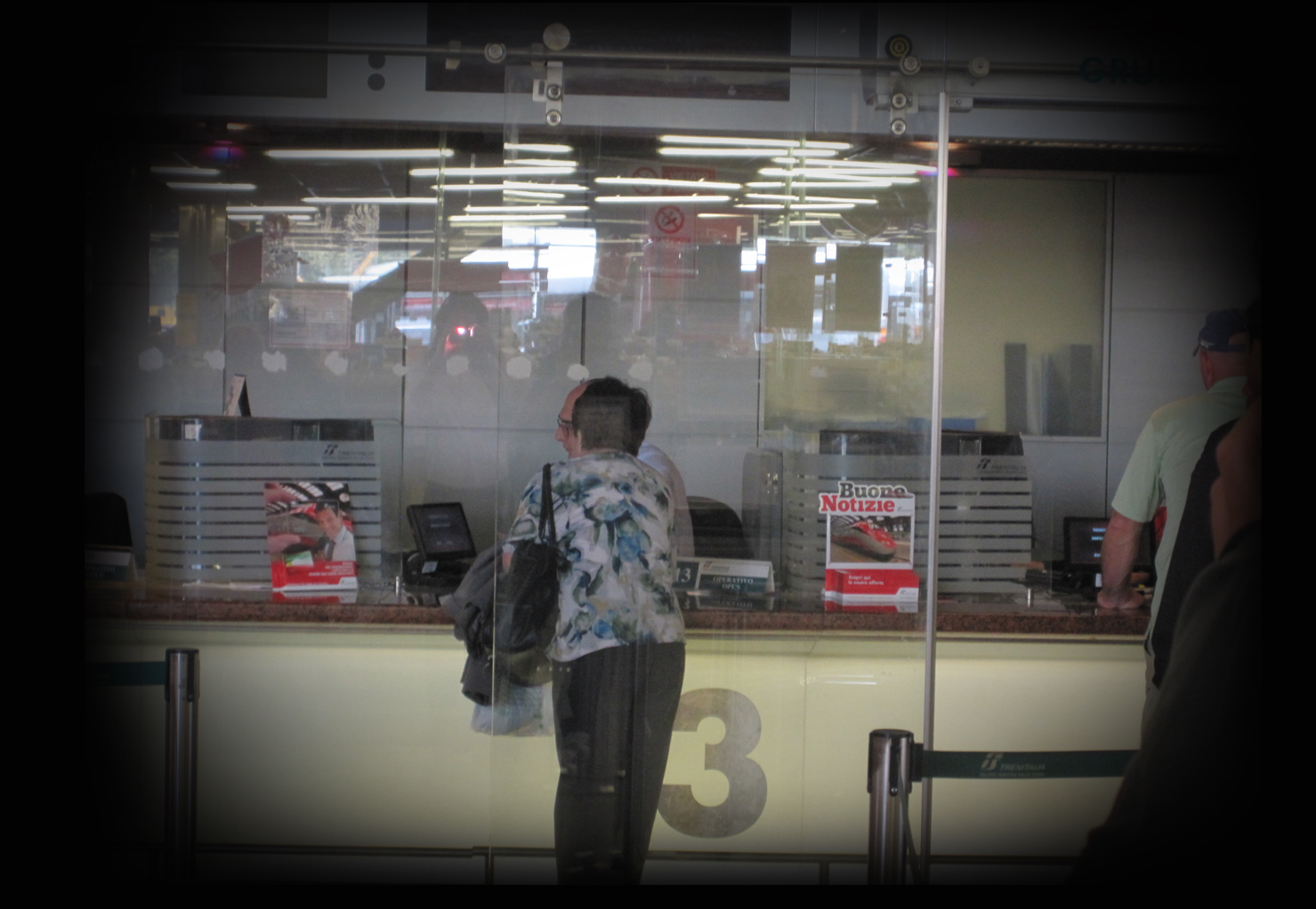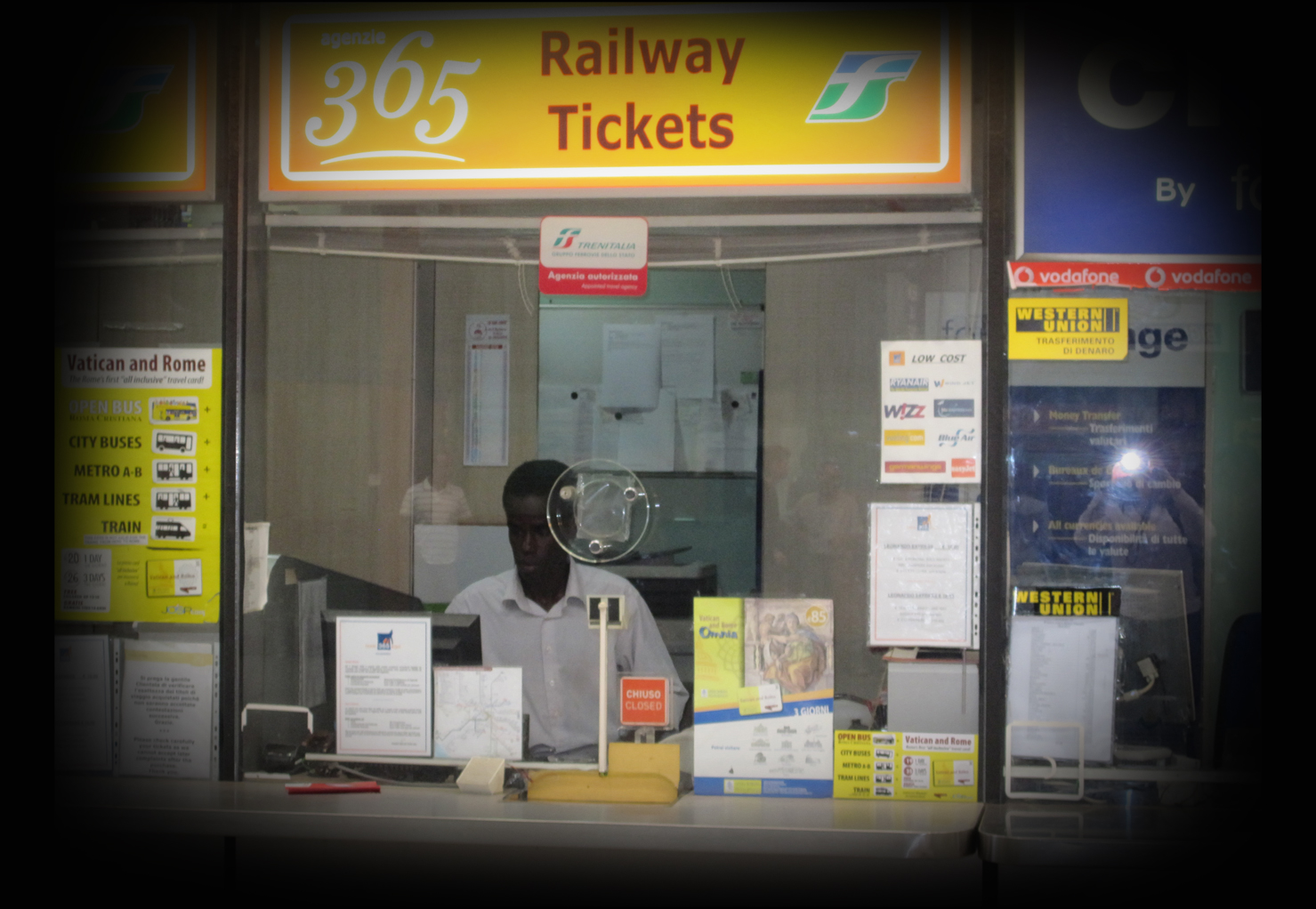
Roma Termini is Rome’s equivalent of Grand Central Station. Spread over several levels it is home not only to the city’s main train station but also to restaurants, shops, boutiques and travel agencies.
While you wait in line to get a ticket, listen to the customer who is buying a ticket to Rome. Work your way through the tabs to listen, repeat, and practice the conversation. Go ahead and listen to the conversation a few times to start. You may not know the words, but can you figure out some meaning from the context of the conversation?


Listen to the conversation 2-3 times before moving to the next tab. What do you hear?
Bigliettaio: Buon giorno. Desidera?
Cliente: Un biglietto per Roma Termini, per piacere.
Bigliettaio: Quindici euro.
Cliente: Quindici? [hands over €20 note]
Bigliettaio:[hands over ticket and €5 change]. Ecco il biglietto e €5 di resto.
Cliente: La ringrazio.
Bigliettaio: A Lei.

How did you do? Were you able to figure out any Italian words from their context? Listen to the conversation again — this time with subtitles in English.
English Translation:
Ticket Agent: Good Morning. How can I help you?
Customer: One ticket for Roma Termini, please.
Ticket Agent: Fifteen euro.
Customer: Fifteen? [hands over €20 note]
Ticket Agent:[hands over ticket and €5 change]. Here is your ticket and €5 change.
Customer: Thank you.
Ticket Agent: Thank you.

Try repeating the conversation. It’s okay if you don’t pronounce everything correctly. Just try speaking some Italian.
Use the audio recorder provided to record your own voice and play it back compared to the model.
There’s a lot going on in that short conversation. I’ll break it down for you.
Italians use a variety of greetings depending on the time of day and the relationship between the people involved. Here we have used ‘Buon giorno’ which means ‘Good morning’, or ‘Good day’.
As you will learn, Italians also use a formal and informal register depending on who they are talking to. Some words and phrases from this exchange reveal a formal register. Hints include ‘Buon giorno’, ‘La ringrazio’, and ‘A Lei’.
The ticket agent and customer are also using numbers to pay and make change.
It’s important to be polite in any language. At the end of the conversation, the customer thanks the ticket agent. Courtesy is also implied by the formal register the customer and ticket agent communicate in the words and phrases used above.
In Italian
Bigliettaio: Buon giorno. Desidera?
Cliente: Un biglietto per Roma Termini, per piacere.
Bigliettaio: Quindici euro.
Cliente: Quindici? [hands over €20 note]
Bigliettaio:[hands over ticket and €5 change]. Ecco il biglietto e €5 di resto.
Cliente: La ringrazio.
Bigliettaio: A Lei.
In English
Ticket Agent: Good Morning. How can I help you?
Customer: One ticket for Rome (Roma Termini is the main train station), please.
Ticket Agent: Fifteen euro.
Customer: Fifteen? [hands over €20 note]
Ticket Agent:[hands over ticket and €5 change]. Here is your ticket and €5 change.
Customer: Thank you.
Ticket Agent: Thank you.
Practice the vocabulary associated with buying a ticket.

When you understand the conversation and feel comfortable with the vocabulary, step up to the window and buy your own ticket. If you don’t get it exactly right, don’t worry. The ticket agent will help you. The most important thing is to try.
Interact with the Ticket Agent to successfully buy a ticket. Use the audio recorder provided to record your own voice and play it back. If you get stuck, use the Help.
Fiona Stewart

 Need Help?
Need Help?